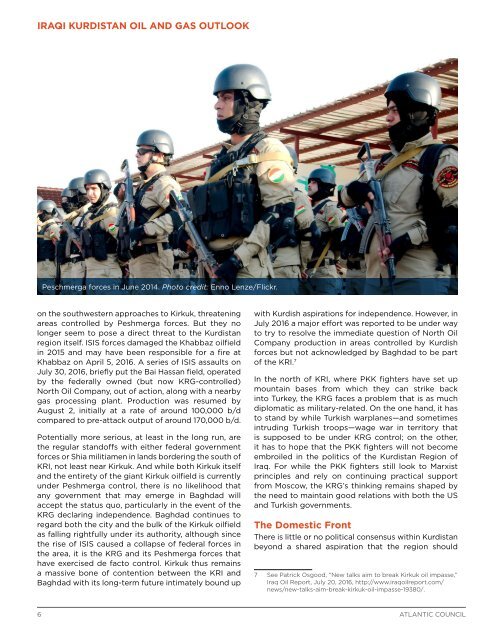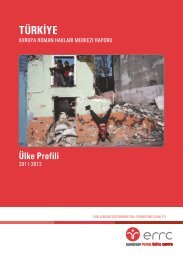Create successful ePaper yourself
Turn your PDF publications into a flip-book with our unique Google optimized e-Paper software.
<strong>IRAQI</strong> <strong>KURDISTAN</strong> <strong>OIL</strong> <strong>AND</strong> <strong>GAS</strong> <strong>OUTLOOK</strong><br />
Peschmerga forces in June 2014. Photo credit: Enno Lenze/Flickr.<br />
on the southwestern approaches to Kirkuk, threatening<br />
areas controlled by Peshmerga forces. But they no<br />
longer seem to pose a direct threat to the Kurdistan<br />
region itself. ISIS forces damaged the Khabbaz oilfield<br />
in 2015 and may have been responsible for a fire at<br />
Khabbaz on April 5, 2016. A series of ISIS assaults on<br />
July 30, 2016, briefly put the Bai Hassan field, operated<br />
by the federally owned (but now KRG-controlled)<br />
North Oil Company, out of action, along with a nearby<br />
gas processing plant. Production was resumed by<br />
August 2, initially at a rate of around 100,000 b/d<br />
compared to pre-attack output of around 170,000 b/d.<br />
Potentially more serious, at least in the long run, are<br />
the regular standoffs with either federal government<br />
forces or Shia militiamen in lands bordering the south of<br />
KRI, not least near Kirkuk. And while both Kirkuk itself<br />
and the entirety of the giant Kirkuk oilfield is currently<br />
under Peshmerga control, there is no likelihood that<br />
any government that may emerge in Baghdad will<br />
accept the status quo, particularly in the event of the<br />
KRG declaring independence. Baghdad continues to<br />
regard both the city and the bulk of the Kirkuk oilfield<br />
as falling rightfully under its authority, although since<br />
the rise of ISIS caused a collapse of federal forces in<br />
the area, it is the KRG and its Peshmerga forces that<br />
have exercised de facto control. Kirkuk thus remains<br />
a massive bone of contention between the KRI and<br />
Baghdad with its long-term future intimately bound up<br />
with Kurdish aspirations for independence. However, in<br />
July 2016 a major effort was reported to be under way<br />
to try to resolve the immediate question of North Oil<br />
Company production in areas controlled by Kurdish<br />
forces but not acknowledged by Baghdad to be part<br />
of the KRI. 7<br />
In the north of KRI, where PKK fighters have set up<br />
mountain bases from which they can strike back<br />
into Turkey, the KRG faces a problem that is as much<br />
diplomatic as military-related. On the one hand, it has<br />
to stand by while Turkish warplanes—and sometimes<br />
intruding Turkish troops—wage war in territory that<br />
is supposed to be under KRG control; on the other,<br />
it has to hope that the PKK fighters will not become<br />
embroiled in the politics of the Kurdistan Region of<br />
Iraq. For while the PKK fighters still look to Marxist<br />
principles and rely on continuing practical support<br />
from Moscow, the KRG’s thinking remains shaped by<br />
the need to maintain good relations with both the US<br />
and Turkish governments.<br />
The Domestic Front<br />
There is little or no political consensus within Kurdistan<br />
beyond a shared aspiration that the region should<br />
7 See Patrick Osgood, “New talks aim to break Kirkuk oil impasse,”<br />
Iraq Oil Report, July 20, 2016, http://www.iraqoilreport.com/<br />
news/new-talks-aim-break-kirkuk-oil-impasse-19380/.<br />
6 ATLANTIC COUNCIL



